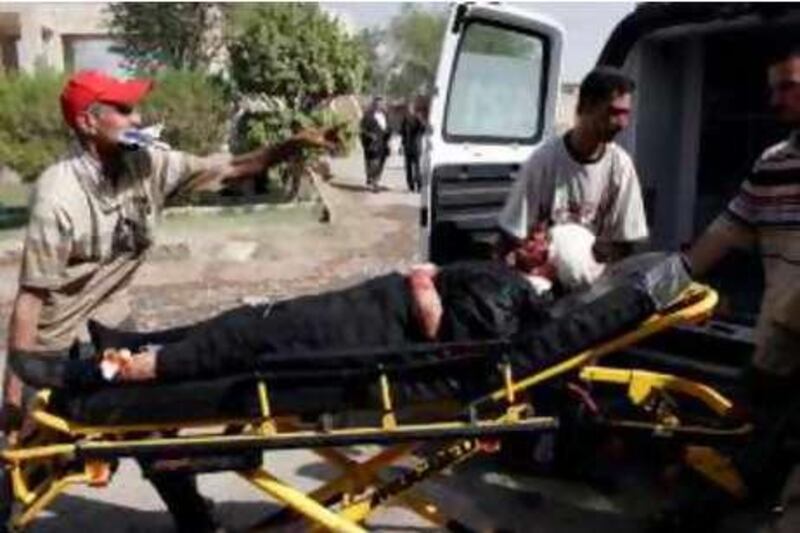AZIZIYAH, IRAQ // It is a grim routine, but one that by now has a feeling of familiarity. A suicide bombing occurs, and shock takes over, followed by fear, then finally anger. Then, with almost the same sense of morbid resignation, life returns to normal, because the dying is happening in another place, another city: so we carry on drinking tea and sweating in the heat because the air conditioning does not work.
But on Monday, it happened in Aziziyah, and that made everything different. This is my town. Aziziyah, a quiet place Iraq where, yes, there are kidnappings, killings, shootings; but, compared to the violence that has engulfed Iraq, comparatively few. While the triple bombings were in Baghdad, 60km to the north-west, what added to the sense of fear was that scores of people from Aziziyah were in the capital that day taking part in the pilgrimage that was the bombers' target.
For hours nothing was clear. Perhaps a million Shiites were expected to take part in the march through the city to the shrine of Imam Musa al Kadhim in Kadhimiya. There were 12, 20 then 28 reported dead, so what were the odds that a loved one would be among them? As the afternoon wore on, the answer emerged: once again this city of 100,000 had contributed some of its sons to the dead. Families began to arrive at Aziziyah hospital, a clearing house for bad news and the place where bodies would be delivered.
In the hours after the bombings, it emerged there were 10 families who knew their lives had been changed forever, and now waited for the bodies of their children or husbands to be returned. Many more people, suspicious and tense, milled around, worried they too would move from the fringes of a disaster into its centre. So many people from Aziziyah had gone to Baghdad for the religious ceremony. Umm Mohammed, dressed in the black shawl Iraqi Shia women commonly wear, had a son and her husband taken from her.
They, and 25 others, were killed when three women - dressed in similar flowing black robes - detonated bombs among the Baghdad crowds. "I can't even begin to think," she said, clearly struggling to keep some kind of control. "I feel my life has suddenly ended. I'm afraid, I'm lonely." As the bodies arrived at the hospital, she fainted. Her son was 15 years old and had left for Baghdad that morning full of excitement. He came home the same day with his head torn from his shoulders.
This is what bombings do; there is no nice way to put it and the details are important. If you say someone has died, it sounds so clean. It might make you think they had a peaceful passing into oblivion, or the paradise of a next life. If you have only seen it on television - especially the western media, which sanitises and censors the brutality of war in a way the Arabic language channels do not - then you will not understand. Umm Mohammed's teenage son had his head blown off, and that is how he was returned to her.
Adnan Abdul Hassan's son was killed - murdered, blown up, torn to pieces - by a woman who wrapped herself in a belt of explosives and nails and, because of Iraq's cultural sensibilities, went unsearched. It is disrespectful to search women, to dare to look under their all encompassing black cloaks. The men are searched, the women never are. "Disaster, it's a disaster, a calamity," Abdul Hassan said. His son had been in secondary school. "My dreams are dead, my son's dreams are dead. He was waiting for his exam results, he wanted to go to college. Everything has gone."
Mixed with his grief, there was rage and incredulity, directed at the Iraqi security forces who had promised to keep the pilgrims safe from harm. "Why didn't someone stop these terrorists?" he demanded to know. No one in the hospital tried to answer because there was nothing to say. "How do I get my son back? Who will restore him?" Most probably the bombers were Sunni extremists determined to kill Shia and spark further sectarian conflict.
In 2005, at the same religious ceremony, 1,000 died in a stampede that started when rumours spread that a suicide bomber was in the crowd. This year the bridge over the Tigris on which all those lives were lost was kept closed, as a security precaution. But death and tragedy simply moved elsewhere, sidestepping the troops and checkpoints. "This is sectarian," Abdul Hassan said. "This is about Sunnis and Shias."
Also at the hospital on Monday was Said Abu Haidar Alhrithi. Another man with a corpse instead of a son. "I tried to prevent him from going because I knew it would be dangerous," he said. "We were assured there was security, that it was safe to attend. They even put up tents to shelter from the sun. There were fruits and vegetables and water so that everyone would be happy and safe." He talked more, about the government not being able to protect its citizens, about bombings and shootings and killers and terrorists. Then, suddenly, he seemed tired of talking.
"This is the will of God," he said. @Email:nlatif@thenational.ae





